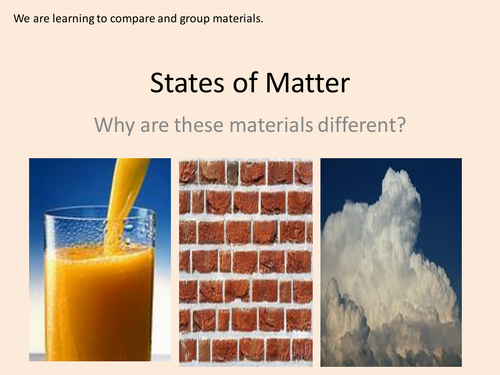




























Everything you need to teach a States of Matter science topic for a half term.
7 lessons, including planning, PowerPoints and resources. Mastery questions included throughout. Plus an end of topic assessment paper and answer paper.
Lesson plans and PowerPoints are explicit and easy to follow.
Where equipment is needed for experiments, equipment lists are provided on the lesson plans and PowerPoints. There are also step by step guides for completing the experiments on the PowerPoints.
All lessons have 3 differentiated follow-up tasks. Most are provided, the rest are on the PowerPoints.
All lessons have an interesting starter, either a brain-teaser mastery style question or a zoomed in photograph to identify (that is relevant to the topic).
Lessons recap, revisit and build upon children's prior knowledge. The repetition during the recapping sections of the lessons are great for supporting children with retaining information.
Throughout the lessons, there are thought provoking 'mastery' style questions, to encourage children to reason and explain.
There are opportunities for peer assessment.
We are learning to's include:
to compare and group materials;
to identify states of matter and their properties;
to investigate freezing and melting/ to conduct a fair test;
to observe when different materials change state when heated or cooled;
to understand an irreversible change;
to identify evaporation and condensation in the water cycle;
to explain the processes of evaporation and condensation.
Opportunity to develop science skills is also covered.
Links to 2014 National Curriculum is made clear on each lesson plan.
Some activities are linked to an Ancient Greek topic through hooks, letters and instructions (not all lessons), however this could be VERY easily adapted to another topic.
All images have been taken from: http://search.creativecommons.org/ where no attribution is required.
7 lessons, including planning, PowerPoints and resources. Mastery questions included throughout. Plus an end of topic assessment paper and answer paper.
Lesson plans and PowerPoints are explicit and easy to follow.
Where equipment is needed for experiments, equipment lists are provided on the lesson plans and PowerPoints. There are also step by step guides for completing the experiments on the PowerPoints.
All lessons have 3 differentiated follow-up tasks. Most are provided, the rest are on the PowerPoints.
All lessons have an interesting starter, either a brain-teaser mastery style question or a zoomed in photograph to identify (that is relevant to the topic).
Lessons recap, revisit and build upon children's prior knowledge. The repetition during the recapping sections of the lessons are great for supporting children with retaining information.
Throughout the lessons, there are thought provoking 'mastery' style questions, to encourage children to reason and explain.
There are opportunities for peer assessment.
We are learning to's include:
to compare and group materials;
to identify states of matter and their properties;
to investigate freezing and melting/ to conduct a fair test;
to observe when different materials change state when heated or cooled;
to understand an irreversible change;
to identify evaporation and condensation in the water cycle;
to explain the processes of evaporation and condensation.
Opportunity to develop science skills is also covered.
Links to 2014 National Curriculum is made clear on each lesson plan.
Some activities are linked to an Ancient Greek topic through hooks, letters and instructions (not all lessons), however this could be VERY easily adapted to another topic.
All images have been taken from: http://search.creativecommons.org/ where no attribution is required.
Something went wrong, please try again later.
This resource hasn't been reviewed yet
To ensure quality for our reviews, only customers who have purchased this resource can review it
Report this resourceto let us know if it violates our terms and conditions.
Our customer service team will review your report and will be in touch.
£9.50
